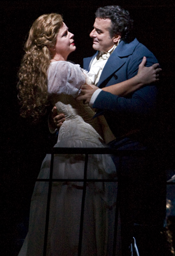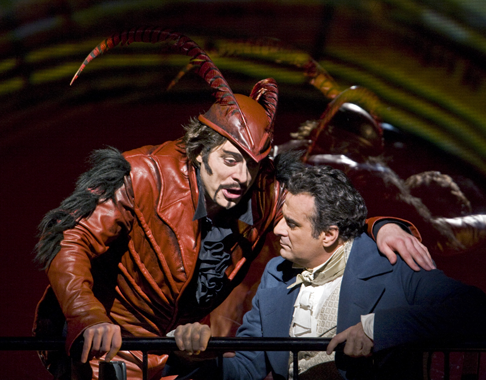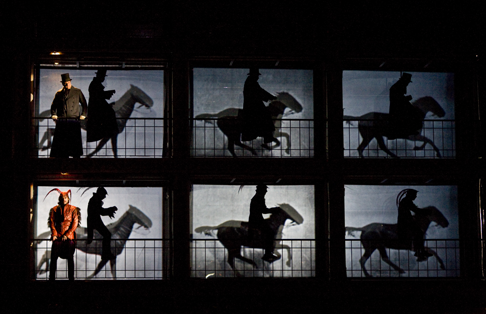
17 Nov 2008
La Damnation de Faust at the MET
The Met has not staged La Damnation de Faust in a hundred years, since 1906, when it clocked a mere five performances.
English Touring Opera are delighted to announce a season of lyric monodramas to tour nationally from October to December. The season features music for solo singer and piano by Argento, Britten, Tippett and Shostakovich with a bold and inventive approach to making opera during social distancing.
This tenth of ten Live from London concerts was in fact a recorded live performance from California. It was no less enjoyable for that, and it was also uplifting to learn that this wasn’t in fact the ‘last’ LfL event that we will be able to enjoy, courtesy of VOCES8 and their fellow vocal ensembles (more below …).
Ever since Wigmore Hall announced their superb series of autumn concerts, all streamed live and available free of charge, I’d been looking forward to this song recital by Ian Bostridge and Imogen Cooper.
The Sixteen continues its exploration of Henry Purcell’s Welcome Songs for Charles II. As with Robert King’s pioneering Purcell series begun over thirty years ago for Hyperion, Harry Christophers is recording two Welcome Songs per disc.
Although Stile Antico’s programme article for their Live from London recital introduced their selection from the many treasures of the English Renaissance in the context of the theological debates and upheavals of the Tudor and Elizabethan years, their performance was more evocative of private chamber music than of public liturgy.
In February this year, Albanian soprano Ermonela Jaho made a highly lauded debut recital at Wigmore Hall - a concert which both celebrated Opera Rara’s 50th anniversary and honoured the career of the Italian soprano Rosina Storchio (1872-1945), the star of verismo who created the title roles in Leoncavallo’s La bohème and Zazà, Mascagni’s Lodoletta and Puccini’s Madama Butterfly.
Evidently, face masks don’t stifle appreciative “Bravo!”s. And, reducing audience numbers doesn’t lower the volume of such acclamations. For, the audience at Wigmore Hall gave soprano Elizabeth Llewellyn and pianist Simon Lepper a greatly deserved warm reception and hearty response following this lunchtime recital of late-Romantic song.
Collapsology. Or, perhaps we should use the French word ‘Collapsologie’ because this is a transdisciplinary idea pretty much advocated by a series of French theorists - and apparently, mostly French theorists. It in essence focuses on the imminent collapse of modern society and all its layers - a series of escalating crises on a global scale: environmental, economic, geopolitical, governmental; the list is extensive.
For this week’s Live from London vocal recital we moved from the home of VOCES8, St Anne and St Agnes in the City of London, to Kings Place, where The Sixteen - who have been associate artists at the venue for some time - presented a programme of music and words bound together by the theme of ‘reflection’.
'Such is your divine Disposation that both you excellently understand, and royally entertaine the Exercise of Musicke.’
Amongst an avalanche of new Mahler recordings appearing at the moment (Das Lied von der Erde seems to be the most favoured, with three) this 1991 Mahler Second from the 2nd Kassel MahlerFest is one of the more interesting releases.
‘And there was war in heaven: Michael and his angels fought against the dragon; and the dragon fought and his angels, And prevailed not; neither was their place found any more in heaven … that old serpent … Satan, which deceiveth the whole world: he was cast out into the earth, and his angels were cast out with him.’
If there is one myth, it seems believed by some people today, that probably needs shattering it is that post-war recordings or performances of Wagner operas were always of exceptional quality. This 1949 Hamburg Tristan und Isolde is one of those recordings - though quite who is to blame for its many problems takes quite some unearthing.
There was never any doubt that the fifth of the twelve Met Stars Live in Concert broadcasts was going to be a palpably intense and vivid event, as well as a musically stunning and theatrically enervating experience.
‘Love’ was the theme for this Live from London performance by Apollo5. Given the complexity and diversity of that human emotion, and Apollo5’s reputation for versatility and diverse repertoire, ranging from Renaissance choral music to jazz, from contemporary classical works to popular song, it was no surprise that their programme spanned 500 years and several musical styles.
The Academy of St Martin in the Fields have titled their autumn series of eight concerts - which are taking place at 5pm and 7.30pm on two Saturdays each month at their home venue in Trafalgar Square, and being filmed for streaming the following Thursday - ‘re:connect’.
The London Symphony Orchestra opened their Autumn 2020 season with a homage to Oliver Knussen, who died at the age of 66 in July 2018. The programme traced a national musical lineage through the twentieth century, from Britten to Knussen, on to Mark-Anthony Turnage, and entwining the LSO and Rattle too.
With the Live from London digital vocal festival entering the second half of the series, the festival’s host, VOCES8, returned to their home at St Annes and St Agnes in the City of London to present a sequence of ‘Choral Dances’ - vocal music inspired by dance, embracing diverse genres from the Renaissance madrigal to swing jazz.
Just a few unison string wriggles from the opening of Mozart’s overture to Le nozze di Figaro are enough to make any opera-lover perch on the edge of their seat, in excited anticipation of the drama in music to come, so there could be no other curtain-raiser for this Gala Concert at the Royal Opera House, the latest instalment from ‘their House’ to ‘our houses’.
"Before the ending of the day, creator of all things, we pray that, with your accustomed mercy, you may watch over us."

The Met has not staged La Damnation de Faust in a hundred years, since 1906, when it clocked a mere five performances.
There are excellent reasons for this reluctance. Berlioz’s magical setting of scenes from Part I of Goethe’s Faust (in de Nerval’s translation, also the basis for Gounod’s opera) focuses hardly at all on the scenes of action that might be cobbled into a stage drama, but almost entirely on the poetic “background” of peasants dancing, students drinking, soldiers marching, fairies flying, devils cavorting, lords a-leaping, maids a-milking. This scene-setting and the fascinating and novel effects Berlioz drew from orchestra and chorus to depict it make up most of the evening, and traditional opera houses, even those equipped with elaborate stage machinery and full corps de ballet, seldom find it worth the effort. If you know Damnation at all, from live performance, it is probably from the concert hall, where the march and the sylphs are favorite show-off numbers, and two of its arias are greatly loved, Marguerite’s “D’amour, l’ardente flamme” and Méphistophélès’s serenade. Damnation fares a poor fourth in dramatic success as an operatic Faust, to works of Gounod, Boito and Busoni – but as a concert piece, it is rather better known than Schumann’s even less stageable Scenes from Faust. (Louis Spohr also composed a Faust, even before Goethe published his poem; one wonders what it can be like.)
As a masterpiece unwieldy by traditional means, Damnation is just the sort of opera the Met, with its spectacular stage and newly upgraded technical pizzazz ought to be putting on, rather than twisted interpretations of operas that worked just fine the old way, such as Peter Grimes, Lucia or (for that matter) Gounod’s Faust. And now the Met has done it, and done it to a turn, in a staging by Robert Lepage (of Cirque de Soleil fame, not irrelevantly), aided by “software artist” Holger Förterer.
The enormous stage is subdivided into fifteen boxes that become alleys in a library, rooms in a tavern, a moonlit bridge over a river (and the depths of that river, and Faust swimming under water), the windows of Marguerite’s house (no rural cottage for this kid, but the street-long palace of the Hohenzollerns), the stained glass windows of a church (with five naked crucifixions) and, at last, the fiery pits of Hell, filled with naked choristers. Nor are three dimensions enough for this production – red-coated demonic lizards crawl about on the surface of it, defying gravity, and soldiers march from stage bottom to top, perpendicular to the wall, before falling, wounded, three stories, into the arms of lamenting sweethearts. Marcello Giordani has to climb a ladder down from the top of the stage (four stories or so) at the evening’s beginning, when Faust is an old man, not yet satanically rejuvenated, and Susan Graham must climb up it at the end, to reach salvation. (No one ever said that route was easy.) The long musical or choral interludes between Damnation’s few action scenes are danced or acted or mimed by enormous non-singing forces (and also the Met chorus, which has seldom had so much to accomplish, while singing to boot), to so busy an extent that I found it, while thrilling, a sometimes unfortunate distraction from the luxurious musical performance Donald Palumbo’s chorus and James Levine’s orchestra were giving to Berlioz’s constantly fascinating concoctions.
While a very young crowd, accustomed to MTV style in which every note has its accompanying video image (and to never shutting their eyes and letting the music make its own image in your head), may be entranced by this production, especially when it comes to movie theaters, there may be too much of a muchness for old-fashioned movie lovers who would like to revel in sheer Berlioz. That curdled opinion only came to me two or three times, but I found little difficulty concentrating on the evening’s musical delights when they were set before me.
 John Relyea (left) as Mephistopheles and Marcello Giordani as Faust
John Relyea (left) as Mephistopheles and Marcello Giordani as Faust
These musical honors, once the dancers, acrobats, and circus and lighting technicians had all been squared away, were neatly shared. Susan Graham may not be the most sensuous of mezzos – what would “D’amour, l’ardente flamme” have been like with Troyanos’s throb in her voice? – but it was splendid to have her back in her element rather than, as her Donna Elvira demonstrated, out of it: she sings Marguerite with total assurance, and fills the hall with the aria’s yearning message. John Relyea, who is obliged to do many athletic tricks in this production (but then, he flew at his debut, in Cenerentola, and mounted and rode a horse in Rodelinda), has a sizable if gruff instrument in which Méphistophélès’s wit and slimy charm if not his malice were always evident. He can win hearts by tossing a feathery leather cap, which he does at every opportunity. The only less than excellent work came from Marcello Giordani, who has made a specialty of heroic French roles (Raoul, Cellini, Enée), but here took half the evening to steady his voice, and was obliged to slide into falsetto once or twice for Faust’s punishing tessitura.
 A scene from Part IV of Berlioz's "La Damnation de Faust" with Marcello Giordani in the title role (top) and John Relyea as Mephistopheles (bottom, in red)
A scene from Part IV of Berlioz's "La Damnation de Faust" with Marcello Giordani in the title role (top) and John Relyea as Mephistopheles (bottom, in red)
The stars, however, were James Levine and the orchestra that he has honed to diamond fineness, tricking out every brilliant detail and glow of Berlioz’s matchless ingenuity, giving us sensual pleasure to survive any distraction. The acrobats and the special effects were a treat, but I don’t think I’m the only one who found the evening’s real delight in the score itself, given such a performance.
This, surely, is as it should be.
John Yohalem